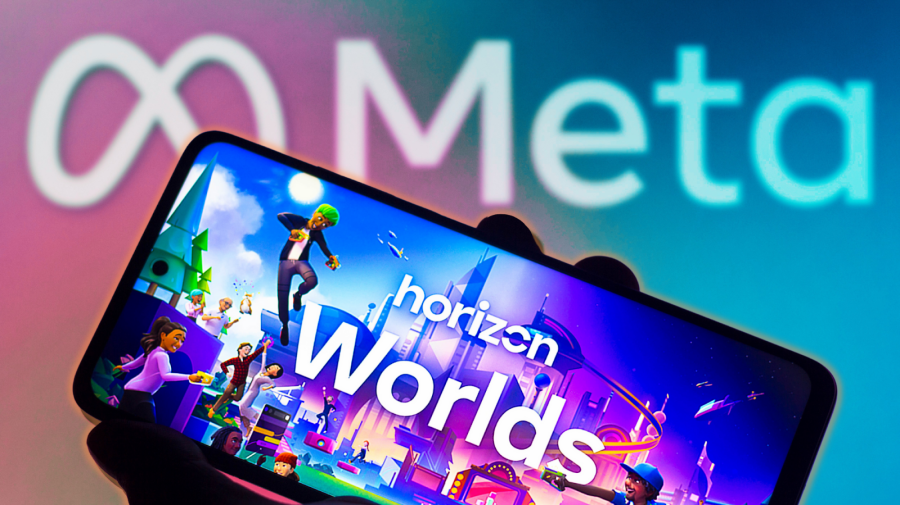
From the moment Mark Zuckerberg announced the Metaverse, people were skeptical. Many fear that Meta’s vision for the future of virtual reality (VR) landscapes brings with it some serious caveats, particularly in the arenas of privacy and safety.
Since the release of Horizon Worlds — a VR hub that features portals to user-generated worlds — some concerning issues have arisen. Couple that with information about the face and eye-tracking features that are reportedly coming with the next iteration of Meta’s VR tech, the Oculus Quest Pro, and the concern builds.
Facebook (now Meta), doesn’t have the best reputation when it comes to privacy, seemingly favoring profits over data security and user rights. With the added risks of a virtual landscape, many people are wondering if Horizon Worlds is a safe place to visit, do business and interact with other users. So, let’s take a closer look.
Meta’s Horizon Worlds: How Meta Views Its Digital Creation
Horizon Worlds is an online landscape that allows users to engage with creator “worlds” using VR technology. It’s touted as a “social experience,” one where users aren’t “just a visitor. [They’re] a part of what makes it great.”
Creation and collaboration are at the heart of the experience, allowing anyone to design immersive experiences that you and other users can discover and explore. While fun and socialization are certainly part of the equation, Meta’s plans stretch beyond those of typical social media platforms when it comes to Horizon Worlds.
Sure, Meta may tout the online landscape’s focus on creators, but its decisions, like the decisions of most businesses, are generally profit-based in the end. For example, Meta intends to let creators sell virtual assets, though it plans to take a 50 percent cut of sales, far more than you see on most digital marketplaces. Data collection and advertisements are also close to Meta’s heart since they create pathways for monetization.

While we don’t know the full extent of how this will shape Horizon Worlds, it’s pretty safe to say that finding various revenue streams within the virtual landscape will be part of Meta’s main focus. While it isn’t inherently an issue that a company wants to turn a profit, how that drive impacts Meta’s decision-making is, potentially, concerning — especially since Facebook has previously sacrificed user privacy and safety in the name of the dollar.
The Privacy and Safety Risks of Hopping into Horizon Worlds
More Meta Devices Means More Opportunities for Data Collection
Accessing Horizon Worlds is free, but it does, as of now, require you to use a compatible device — namely, an Oculus Quest. Since the VR headset is designed and owned by Meta, the only way you can engage with the Horizon Worlds is through one of the company’s devices. Additionally, you have to log into a Facebook account, creating a direct connection between you, your device and your activity.
While requiring company-created devices doesn’t seem inherently problematic, it could come with risks. VR headsets may gather far more data than you expect through their various sensors, microphones and more. Considering that they’re in a user’s home, that alone should give a person pause, particularly with Meta’s questionable privacy history.
Meta is trying to keep the narrative positive, however. Two Facebook VPs — Andrew Bosworth and Nick Clegg — both assert that the Metaverse will be built responsibly. “The Metaverse won’t be built overnight by a single company,” a blog post written by the pair reads. “We’ll collaborate with policymakers, experts and industry partners to bring this to life.”
There are also claims that the company will engage with civil rights and human rights entities, ensuring the resulting technologies are “built in a way that’s inclusive and empowering.” However, many would-be users have doubts, mainly because the potential for data collection — and the associated financial gains of that data collection — may make that supposed privacy less of a priority for Meta.
Face and Eye-Tracking Are an Advertisers Dream and Could Generate Massive Profits for Meta
The fact that Meta would aim to monetize Horizon Worlds isn’t a surprise. However, the company’s approach might be a cause for concern. The face and eye-tracking technologies built into upcoming Oculus headsets won’t just create new opportunities for immersive experiences, but new paths for advertising, too.
Multiple patent filings have given us some clues as to how Meta may monetize this new digital landscape. Face and eye-tracking data could take personalized advertising to the next level, for starters. After all, it allows Meta — and companies they potentially provide the data to — to gauge your response to various aspects of the virtual landscape, including advertisements.

In many ways, the issue has less to do with the use of the data. Instead, many have fears regarding both informed consent during said data collection and the safeguarding of users’ critical, personal details. For example, a person’s eyes are highly unique, which is why technologies like retinal scanner locks work so well. However, even if Meta claims it’ll anonymize data, its access to your Facebook account information coupled with that biometric data is concerning, to say the least.
There are also concerns that face- and eye-tracking data may reveal more than you’d like. Depending on the environment and the sensor’s capabilities, the data may capture eye movements or facial expressions that allow Meta to determine whether you like a person or not — or even your level of attraction to them.
By and large, eye movements and micro-expressions are unconscious and involuntary. Since that’s the case, they’re incredibly revealing. While using a “like” button requires conscious action and an active decision, what you tell a company through these involuntary movements isn’t entirely under your control.
Safety in Horizon Worlds Isn’t Just About Data
In Horizon Worlds, users can engage directly with one another. While the main goal is likely to create opportunities for gathering with loved ones and meeting new friends, the approach also comes with risks, not unlike the risks associated with all social media platforms.
Currently, there are already multiple reports of women being sexually harassed and groped while in the VR landscape. While Facebook did unroll a new feature — a “Personal Boundary,” which creates a bubble of space around your avatar — to combat the issue, that won’t inherently prevent verbal assaults or other forms of harassment.
Additionally, the Personal Boundary isn’t a requirement. Instead, it’s an optional setting that users can switch on and off. By default, the Personal Boundary will be on for non-Friends only, but will allow people on each other’s Friends lists to enter into close proximity to one another. However, being on someone’s Friends list isn’t an explicit demonstration of trust. Since that’s the case, users may either need to update the setting on their own or exercise caution when engaging with others.
It also isn’t clear how much Meta can — or, ultimately, will — do to safeguard users from this kind of cyberbullying experience, nor is it clear how Meta will ensure that your data remains secure and private. For now, we can only focus on what we do know: Horizon Worlds is based on relatively new technology — technology with very limited regulation. That said, it may take a long time for clear legal expectations to be put in place, leaving the virtual landscape somewhat precarious for current users.






